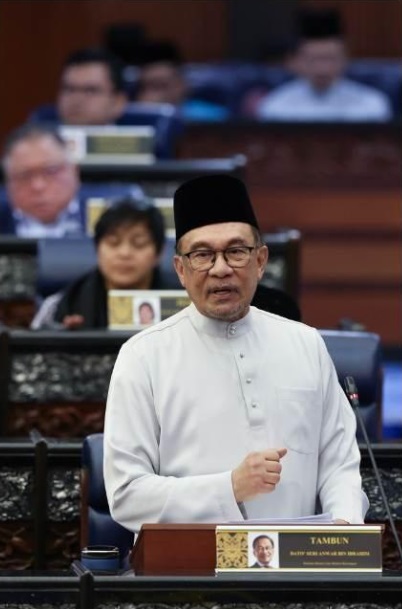The path to a sustainable future is clear, but it requires collective action, effective international partnership and unwavering commitment.
Deputy Prime Minister and Minister of Energy Transition and Water Transformation, Datuk Seri Fadillah Yusof said this, foreseeing a world that balances economic prosperity with environmental stewardship by driving energy transition and water sustainability, particularly in rapidly developing regions like Asia.
“Southeast Asian nations, including Malaysia, are making significant progress (in the adoption of renewable energy (RE)),” he said, citing Vietnam as an example since the country has seen exponential growth in its solar energy sector and it is now the largest solar market in Southeast Asia.
At the same time, Malaysia has also been pioneering the open grid access mechanism and the development of floating solar farms its solar auction exercise to maximise land use efficiency.
Despite this progress, Fadillah pointed out that the region faces several challenges in its energy transition efforts which include the need for grid infrastructure enhancement to cater to the increasing demand for renewable development, especially variable renewable generation sources that were intermittent in nature, as the scale of investment required for a comprehensive energy transition was immense.
“Therefore, mobilising capital, particularly for developing nations, remains a challenge,” he added.
In the Asia-Pacific region and particularly in Malaysia, Fadillah said water sustainability has become a pressing concern due to rapid urbanisation, population growth and the impacts of climate change.
Additionally, rapid industrialisation and inadequate wastewater treatment have led to significant water pollution problems in many Asian countries, which Fadillah advises to address by saying that such countries should adopting innovative approaches to water management such as Malaysia’s ‘Sponge City’ concept in Putrajaya that uses green infrastructure to manage stormwater and reduce flood risks.
TNB to see stable returns from hydropower plants
Apart from the ‘Sponge City’ concept, Tenaga Nasional Bhd (TNB) is expecting to see continuous stable returns from its hydropower plants following the implementation of the Hydro Life Extension Programme (HELP).
Approved in 2022, the HELP involves the refurbishment of 6 hydropower plants in Sungai Perak with a cumulative capacity of about 650 megawatts (MW).
It was reported that TNB is investing RM5.8 billion in the project and the 6 refurbished stations are expected to contribute RM200 million annually to the group’s earnings before interest and tax.
On this, RHB Investment Bank Bhd (RHB IB) said that all power purchase agreements have been signed with much higher tariffs, ranging from 45 sen to 71 sen per kilowatt-hour (kWh).
“With that, the project’s internal rate of return (IRR) could reach double digits based on a contract tenure of 40 years,” it said.
The investment bank said it now has better clarity over the potential of TNB’s 2.5-gigawatt (GW) hybrid hydro floating solar (HHFS) photovoltaic (PV) flagship project under the National Energy Transition Roadmap following a recent technical visit to the Chenderoh hydropower plant in Perak.
RHB IB said that the Chenderoh hydropower station, selected as Phase 1 of the HHFS project, has the potential to generate up to 70MW of floating alternating current (AC) solar power.
“The project is already at the advanced development stage pending several relevant regulatory approvals and finalisation of the business model.
“Construction is estimated to start in the first quarter of 2025 for 15-20 months. TNB is aiming to close the project with an IRR of a high single digit,” it said, maintaining its earnings estimates and target share price of RM16.70 for the utility giant.
“TNB should also continue benefitting from the continuous upgrade in transmission and distribution assets, where energy demand can be anchored by the mushrooming data centre developments,” it said.
TNB’s role in realising APG initiative

At the same time, the government is planning to look at how TNB can play a role in realising the ASEAN Power Grid (APG) initiative.
Prime Minister Datuk Seri Anwar Ibrahim said that in conjunction with the ASEAN chairmanship which Malaysia will assume next year, the APG is one of the main focuses of the government with the aim to make the country and the region the main energy hub for the future.
“The government is aware that the investment is huge and is thinking of ways for TNB to be able to work together with other groups to make APG a success,” he said, expressing his hope that TNB will reduce its reliance on coal and switch to RE as soon as possible.
“The Green Building Index (GBI) and the Green Pathway are things that the old management had never heard of or thought about. This is the demand of the times and if we want Malaysia to succeed, we must have the tenacity to act quickly and boldly,” he added, noting that TNB has conducted thorough research and found ways and methods so that the energy transition is smooth and effective.
“TNB is now challenged to make the energy transition, (which needs to happen) as soon as possible and to continue doing research so that our energy transition goes smoothly and effectively,” Anwar ended.
The post Path to Sustainable Future Requires Collective Action first appeared on Energy Asia.